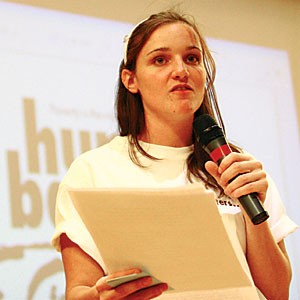Lydia McCune was already nervous. She had embarked on a 30-hour fast the night before, and here she was already hungry after waking up at 10 a.m. Monday – after only 12 hours without eating. After drinking a pink smoothie, she started the fast again.
McCune, a member of the University Activities Board and a junior majoring in molecular and cellular biology, coordinated the first ever 30-hour fast at the UA to correlate with the university’s annual Hunger Banquet, which raises awareness for world hunger.
“”I think the biggest problem in America is that we don’t realize what’s going on in the world around us,”” McCune said. “”People don’t realize how lucky we are and how we can help people with so little.””
At the UA Mall on Monday, McCune, Christine McCaleb, a junior majoring in international development who also helped coordinate the event, and fellow members signed up more than 100 students to participate in the 30-hour fast at the Mall. Their tent had a chain of more than 100 red paper rings wrapped around the poles. Each red ring represented one person who participated in the fast. The group also collected more than $400 and a box of food, McCune said.
The rules of the fast were simple; participates can’t eat, but were encouraged to stay as hydrated as possible. The group did not monitor each individual, but hoped that all participants followed the fast because of their own conviction, McCune said.
At 6:30 p.m. Monday, 6 1/2 hours into the fast, McCune began to feel fatigue.
“”I’m tired from the stress and I could sleep,”” McCune said. “”I was really hungry around 5, but I drank some water and I was OK.””
Gale Welter, a nutritional health worker at Campus Health Service, said that fatigue and lack of concentration are normal side effects for people who haven’t eaten.
“”Energy is needed to run the brain,”” Welter said.
The body of an individual who has not eaten for long periods of time begins to shut down, Welter said. The less important body functions – such as the reproductive organs and the ability to produce body heat – stop working, Welter said.
At 10 a.m. yesterday, 22 hours into the fast, McCune was “”super-hungry.””
“”While I was getting dressed my stomach was saying, ‘Please feed me,'”” she said, laughing.
Later that day, McCune and McCaleb began to think about the foods they would eat as soon as the fast was over.
“”We’re going to eat this and this tonight,”” McCune said jokingly.
Welter said people who haven’t eaten will begin to think about food.
“”All starving people think about food,”” she said. “”It’s a defense mechanism.””
McCune and McCaleb finally ate at 5:20 p.m.
“”I had to eat; I was light-headed,”” McCune said. “”I ate salmon, some vegetables and a cookie. It was amazing.””
The fast lasted a total of 31 hours. McCune said she didn’t want to go onstage and speak while light-headed.
McCaleb said it was a better experience than she expected. The event raised $1000, and 110 people participated in the fast. Half of the proceeds will go to the Tucson Community Food Bank and the other half will go to Oxfam America, a national relief group.
“”I wanted to keep going to see how much I could push myself,”” McCaleb said.
The Hunger Banquet was at 6 p.m. last night. Participants completed their 30-hour fasts and ate for the first time.
But there was a twist to the banquet.
People attending the banquet pulled a ticket from a basket. There were three possibilities; blue, yellow and purple.
People who received a blue ticket were in the “”low income”” and sat on the floor and only ate rice. Others received a yellow ticket were “”middle income”” and ate on tables and received rice and beans. The rest received purple tickets which were “”high income”” and ate on fancy tables and were served an entree with rice and beans.
Pizza was available after the demonstration.
This was done to represent the real world, McCune said.
“”At least we know that we could eat at a certain time,”” she said during the fast. “”And a lot of people can’t do that.””









